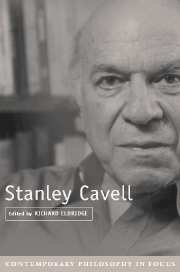Book contents
- Frontmatter
- Contents
- List of Contributors
- Stanley Cavell
- 1 Introduction: Between Acknowledgment and Avoidance
- 2 Stanley Cavell and Ethics
- 3 The Names of Action
- 4 Stanley Cavell's Vision of the Normativity of Language: Grammar, Criteria, and Rules
- 5 Aesthetics, Modernism, Literature: Cavell's Transformations of Philosophy
- 6 A Second Primavera: Cavell, German Philosophy, and Romanticism
- 7 Cavell on American Philosophy and the Idea of America
- 8 “Disowning Knowledge”: Cavell on Shakespeare
- 9 Cavell on Film, Television, and Opera
- Brief Annotated Bibliography of Works by and about Stanley Cavell
- Index
4 - Stanley Cavell's Vision of the Normativity of Language: Grammar, Criteria, and Rules
Published online by Cambridge University Press: 08 January 2010
- Frontmatter
- Contents
- List of Contributors
- Stanley Cavell
- 1 Introduction: Between Acknowledgment and Avoidance
- 2 Stanley Cavell and Ethics
- 3 The Names of Action
- 4 Stanley Cavell's Vision of the Normativity of Language: Grammar, Criteria, and Rules
- 5 Aesthetics, Modernism, Literature: Cavell's Transformations of Philosophy
- 6 A Second Primavera: Cavell, German Philosophy, and Romanticism
- 7 Cavell on American Philosophy and the Idea of America
- 8 “Disowning Knowledge”: Cavell on Shakespeare
- 9 Cavell on Film, Television, and Opera
- Brief Annotated Bibliography of Works by and about Stanley Cavell
- Index
Summary
One striking respect in which Stanley Cavell's way of inheriting the philosophical practices of Austin and Wittgenstein differs from that of most who acknowledge their continuing pertinence is evident in his sense that ordinary language philosophy is in constant dialogue with scepticism. According to Cavell, the sceptic's challenge is neither simply to be accepted on its own terms nor simply to be rejected as nonsensical; it must rather be interpreted as an undismissable threat, a shadow that ordinary language cannot avoid casting, and whose presence and nature tell us something fundamental about the presence and nature of that which casts it. And this interpretation of (ordinary language's relation to) scepticism itself depends upon Cavell's distinctive interpretation of what Wittgenstein (like, and unlike, Austin) takes himself to be invoking when he recalls the grammar or the criteria of words – when, in the face of philosophical confusion, he asks himself, and invites us to ask ourselves, ‘what we should say when’.
This invitation is, of course, regularly made by more traditional Wittgensteinians; but it is then typically assumed that its acceptance will demonstrate that scepticism is not so much undismissable as inexpressible – a refusal (more or less self-conscious, more or less duplicitous) of the conditions of intelligible speech. By contrast, Cavell takes it that any humanly serious expression of scepticism will not be describable as a simple refusal of this invitation (since, for him, the sceptic's use of words turns out to be a not wholly unnatural projection of our ordinary use, and the sceptic will have some account to give of its less-than-full naturalness); hence he rejects the familiar Wittgensteinian idea that simply to recall criteria will or must silence the sceptic.
- Type
- Chapter
- Information
- Stanley Cavell , pp. 79 - 106Publisher: Cambridge University PressPrint publication year: 2003
- 3
- Cited by



